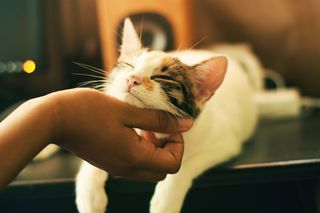Personality
Cat Owners, Personality, and Pet Parenting Style
Links between people's personality and their cats' health and behavior.
Posted April 30, 2019 Reviewed by Matt Huston

Many people think of their pets as family, and some refer to themselves as “pet parents” or “dog moms.” Are there really similarities between caring for a pet and caring for a child?
One way to consider the question involves looking at the links between an owner’s personality and their pet’s lifestyle, health, and behavior to see if they parallel the links between a parent’s personality and their child’s health and behavior. A study published in PLOS One did just that by asking over 3,300 cat owners to complete a survey.
The results show there are links between the personality of cat owners and the behavior of their cats. Dr. Lauren Finka (Nottingham Trent University), the first author of the study, told me in an email:
“For me, these results further highlight the potential ways in which our lifestyle choices for our pets, as well as our general behavior around them, might impact on their well-being. I think we very often underestimate such relationships, so it’s important that we bring this more into our awareness as responsible animal caretakers.”
People with high scores for neuroticism tend to be less stable emotionally, which is linked to mood swings, poorer coping skills, and poorer physical and mental health. Previous research also shows that when a parent has high neuroticism scores, their parenting style may be more anxious and authoritarian, and the environment in which they are bringing up the child may be less stable. In turn, the child is more likely to have behavioral problems, including shyness, anxiety, and aggressive behavior.
In contrast, when parents have low neuroticism scores, but score highly on the four other personality traits—agreeableness, conscientiousness, extraversion, and openness—it is associated with better parenting styles and better outcomes for the children.
So, does the same apply to cats?
The results of this study showed that when cat owners score highly on neuroticism, they also report poorer outcomes for their cats. Cats belonging to people who had high neuroticism scores were more likely to be reported as overweight, having a medical condition or behavior problem, being aggressive or anxious, or having a behavior problem related to stress.
These owners were also more likely to have a cat that was not a pedigree and to restrict or prevent outdoor access for their cat. The study took place in the UK, where some outdoor access is the norm for cats.
When pet owners had low neuroticism scores and were higher on the other personality traits, they gave better ratings for their cats. For example, people who are highly conscientious have cats that are less likely to be aggressive, fearful, or aloof, and more likely to be gregarious. When people scored high on agreeableness, they were more likely to say they were satisfied with their cat. And extroverts were more likely to give their cat access to the outdoors whenever they wished.
This study is correlational and cannot show causation, but it raises many interesting questions for future research. For example, if we think about the increased number of medical conditions among the cats of people with high neuroticism scores, is this because the owners were more attentive to their cats and therefore more likely to take them to the vet when needed? Or were they more anxious and therefore perhaps noticing issues that weren’t really there?
Previous research has looked at the effects of owner personality on dog behavior. The present study suggests that people’s personality may indeed affect the way they care for their pets and in turn their pet’s health and behavior. These results seem to parallel those found in studies of parent personality and child health and behavior, but more research is needed to understand the causes of these differences.
Facebook Image Credit: Ulza/Shutterstock
References
Finka, L. R., Ward, J., Farnworth, M. J., & Mills, D. S. (2019). Owner personality and the wellbeing of their cats share parallels with the parent-child relationship. PloS one, 14(2), e0211862.


